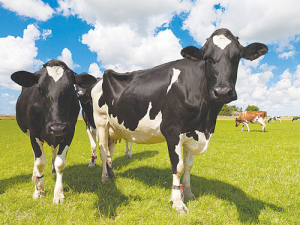LIC lifts half-year revenue on strong demand for dairy genetics
Herd improvement company LIC has posted a 5.2% lift in half-year revenue, thanks to increasing demand for genetics.
 LIC says a bacterial contamination is the likely cause of a semen quality issue that impacted 1,127 herds last year.
LIC says a bacterial contamination is the likely cause of a semen quality issue that impacted 1,127 herds last year.
A bacterial contamination is the likely cause of a semen quality issue that impacted 1,127 herds in October last year, says LIC.
Last year, impacted farmers were notified by the farmer-owned co-operative of a quality issue that affected some batches of semen that were inseminated on farms on 17-19 October and 23-25 October. Cows did get in calf from the inseminations on the affected days, but a noticeably lower number than LIC would expect. Credit and goodwill packages totalling $2m were offered to farmers to support recovery.
LIC chief executive, David Chin, says every possibility was investigated and multiple scenarios were recreated using the semen from the impacted days which is routinely frozen and stored for research purposes.
“While we were able to narrow it down to a possible cause, it was not possible to identify the exact root cause of the bacterial contamination. We considered every possibility, from the bull farm to on-farm insemination, and were able to rule out many possible causes by process of elimination.
“We are now focused on implementing the recommendations that stemmed from the investigation to reduce the likelihood of this ever happening again.”
LIC will have over half of the recommendations in place by March this year, with many improvements already implemented.
“When we first identified this issue, we made immediate changes to our quality control checking process. Now, daily quality control checks occur at 4am every morning prior to insemination on farm on that given day. This change means we can notify AB Technicians of any issues and ask them to use back up semen instead, so we can still get cows in calf,” says Chin.
Chin acknowledges that for impacted farmers the full extent of the situation is now coming to light as they complete pregnancy testing.
“Getting cows in calf is what we do – and we have a very good track record at doing just that. We acknowledge the impact this situation caused for individual cows in herds and we are disappointed that, in this instance, we didn’t deliver to the high standard farmers expect.
“We are not closing the book on this – as a farmer-owned co-op we are always looking at ways we can improve our processes to deliver farmers the right tools to breed the most sustainable and profitable herds - now and into the future,” says Chin.
Dairy Women's Network (DWN) has announced that Taranaki dairy farmer Nicola Bryant will join its Trust Board as an Associate Trustee.
Rural Women New Zealand (RWNZ) says it welcomes the release of a new report into pay equity.
Red meat exports to key quota markets enjoyed $1.4 billion in tariff savings in the 2024-25 financial year.
Remediation NZ (RNZ) has been fined more than $71,000 for discharging offensive odours described by neighbours as smelling like ‘faecal and pig effluent’ from its compositing site near Uruti in North Taranaki.
Two kiwifruit orchards in the Bay of Plenty and one in Northland are this year's finalists for the Ahuwhenua Trophy competition.